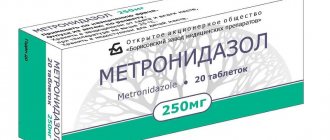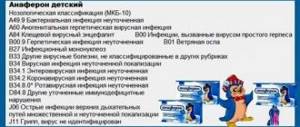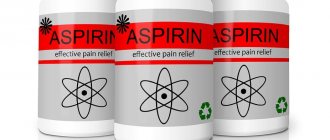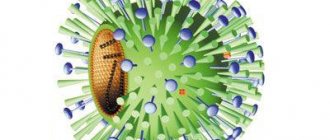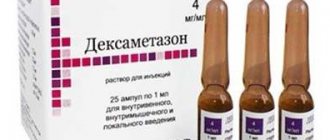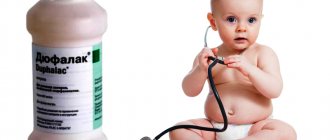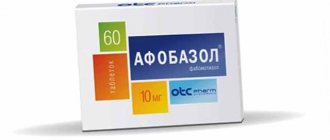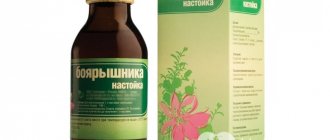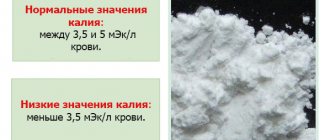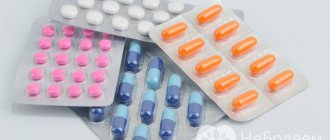One of the most common painkillers is pentalgin. When pain interferes with leading a normal lifestyle, there is a need to quickly relieve it with the most effective means. In such cases, many choose this particular drug. Unfortunately, an overdose of pentalgin is not uncommon, because the desire to quickly regain normal well-being often leads to exceeding the permissible dose of the drug and, as a result, disruptions in the functioning of many organs and systems.
Release form and composition
Pentalgin is available in the form of film-coated tablets: in the form of a capsule with beveled edges, biconvex, pale green to green in color, with a dividing line on one side and embossed “PENTALGIN” on the other; when cut, it is pale green in color with white inclusions (2, 6, 10 or 12 pcs. in a blister pack made of printed varnished aluminum foil and polyvinyl chloride film, 1 or 2 packs in a cardboard pack).
Composition of 1 tablet:
- Active ingredients: pheniramine maleate – 10 mg, drotaverine hydrochloride – 40 mg, caffeine anhydrous – 50 mg, naproxen – 100 mg, paracetamol – 325 mg;
- Additional components of the core: indigo carmine (E 132), quinoline yellow dye (E 104), talc, magnesium stearate, butylated hydroxytoluene (E 321), citric acid monohydrate, hyprolose (hydroxypropylcellulose (Klucel EF)), croscarmellose sodium, potato starch, microcrystalline cellulose ;
- Film coating: indigo carmine (E 132), quinoline yellow dye, talc, titanium dioxide, polysorbate-80 (Tween-80), povidone (medium molecular weight polyvinylpyrrolidone), hypromellose (hydroxypropyl methylcellulose).
Organs affected by the toxin
The combined use of pharmacological agents and alcohol has a toxic effect on the internal organs and environments of the body. Alcohol, entering into a chemical reaction with a medicine, leads to poisoning, disrupts physiological processes, enhances or weakens the healing properties of drugs.
The liver suffers more than other organs. She gets hit twice. Many medications have a side effect - hepatotoxicity, destroy cells, and disrupt the physiology of the organ. In the liver, alcohol breaks down to ethanal, a substance 20-30 times more toxic than ethanol, which causes the death of hepatocytes.
Dangerous groups of drugs for the organ in combination with alcohol:
- anti-inflammatory;
- hormonal;
- antibacterial;
- antifungal;
- glucose control agents for diabetes mellitus;
- anti-tuberculosis;
- cytostatics (chemotherapy drugs);
- tranquilizers (anti-epileptic, psychotropic).
In second place among the internal organs exposed to the harmful effects of alcohol together with medications are the heart and vascular system. Strong drinks during drug therapy constrict blood vessels and increase blood pressure. The simultaneous intake of alcohol and chemical substances leads to failure of the myocardium and increases the risk of developing an attack of angina pectoris and a heart attack.
A mixture of ethanol and pharmaceuticals disrupts the quality of the blood and reduces clotting. This is dangerous due to internal bleeding and strokes.
Indications for use
- Pain syndrome of various origins, including pain in muscles and joints, radiculitis, neuralgia, algomenorrhea, headache (including those caused by cerebral vasospasm), toothache;
- Pain syndrome caused by spasm of smooth muscles (including against the background of cholelithiasis, chronic cholecystitis, postcholecystectomy syndrome, as well as renal colic);
- Postoperative and post-traumatic pain syndrome, including those accompanied by the development of an inflammatory process;
- Colds occurring with febrile syndrome (as a means of symptomatic therapy).
General information
The components of the drug are selected in such a way as to quickly relieve pain and improve the general condition of the patient. It simultaneously affects different systems of the human body, exhibiting antispasmodic, antipyretic, analgesic, anti-inflammatory and antihistamine effects.
Pentalgin is used for dental, headache, neuralgic and joint pain. Helps with respiratory viral diseases. Can be purchased over-the-counter in the pharmacy chain. The tablets have a greenish shell and an oblong shape. Available in packs of 2–24 pcs.
Composition of Pentalgin:
- Paracetamol and Naproxen. The substances lower the temperature and eliminate pain of various origins.
- Drotaverine. It is an effective antispasmodic. Affects the smooth muscles of blood vessels, urinary organs, gastrointestinal tract and biliary tract.
- Pheniramine. An antihistamine with a mild sedative effect. Eliminates exudation, potentiates the effect of analgesics (Paracetamol and Naproxen).
- Caffeine. Improves blood circulation, tones brain vessels. Normalizes the general condition of the patient, stimulates activity. Shows a vasodilating effect, eliminates lethargy and drowsiness. Increases the permeability of the BBB, allowing analgesics to penetrate the blood more quickly.
The substances complement each other, enhancing and prolonging the effect of use.
Contraindications
Absolute:
- Gastrointestinal bleeding;
- Erosive and ulcerative lesions of the digestive tract (in the acute stage);
- Full or partial combination of recurrent polypous rhinosinusitis, bronchial asthma and intolerance to acetylsalicylic acid or any other non-steroidal anti-inflammatory drugs (including history);
- Severe forms of liver and/or kidney failure;
- Processes accompanied by inhibition of bone marrow hematopoiesis;
- Conditions after coronary artery bypass surgery;
- Serious organic lesions of the cardiovascular system (including acute myocardial infarction);
- Frequent ventricular extrasystole;
- Paroxysmal tachycardia;
- Severe form of arterial hypertension;
- Hyperkalemia;
- Breastfeeding period and pregnancy;
- Age up to 18 years;
- Hypersensitivity to the components of the drug.
Relative (the drug should be taken with caution due to the high likelihood of adverse reactions): cerebrovascular diseases, lesions of peripheral arteries, diabetes mellitus, history of ulcerative defects of the gastrointestinal tract, mild to moderate severity of functional failure of the liver and/or kidneys, alcoholic impairment liver, viral hepatitis, benign hyperbilirubinemia (Rotor, Dubin-Johnson and Gilbert syndrome), glucose-6-phosphate dehydrogenase deficiency, epilepsy and a tendency to seizures, old age.
If you have any of the listed conditions/diseases, you should consult your doctor before taking the product.
Pharmacological properties
Pharmacodynamics
Pentanov-N is a combination drug that has antipyretic, anti-inflammatory and analgesic effects.
Pharmacological actions of the drug due to its active components:
- metamizole sodium, naproxen: have anti-inflammatory and analgesic effects;
- codeine: by stimulating opiate receptors in various parts of the central nervous system, it activates the antinociceptive system and changes the emotional perception of pain;
- phenobarbital, codeine: increase the analgesic effect of naproxen and metamizole sodium;
- caffeine: increases physical and mental performance, promotes dilation of blood vessels in the kidneys, skeletal muscles, heart and brain, eliminates drowsiness and fatigue, increases the permeability of histohematic barriers and the bioavailability of non-narcotic analgesics, thereby enhancing the therapeutic effect of Pentanov-N.
Pharmacokinetics
All active substances included in Pentanov-N, when taken orally, are well absorbed in the gastrointestinal tract.
Pharmacokinetic characteristics of the active components of Pentanova-N:
- metamizole sodium: hydrolyzed in the intestinal wall, forming its active metabolite - 4-methyl-amino-antipyrine, which in turn is metabolized into 4-formyl-amino-antipyrine and other metabolites. The level of binding of 4-methyl-amino-antipyrine to blood proteins varies from 50 to 60%. Metabolites are excreted through the kidneys and are also excreted in breast milk;
- naproxen: bioavailability of the substance is 95%, binding to blood proteins is 98–99%. The half-life is from 12 to 15 hours. Mainly in the form of a metabolite (dimethylnaproxen) it is excreted in the urine, in small quantities – in bile;
- caffeine: absorbed in the intestines; the half-life is 5 hours, but sometimes increases to 10 hours. Approximately 10% of the substance is excreted unchanged, the remainder is excreted mainly in the form of metabolites by the kidneys;
- codeine: binds to blood proteins slightly. It undergoes biotransformation in the liver (through demethylation, 10% becomes morphine). Unchanged, 5 to 15% of the dose is excreted by the kidneys;
- phenobarbital: its bioavailability is 80%. In blood plasma it is 50% protein bound and penetrates well through the placenta. Biotransformation of the substance occurs in the liver. Its main metabolite is pharmacologically inactive. Excreted via the kidneys, including 20 to 25% unchanged.
Directions for use and dosage
Pentalgin is taken orally.
Recommended dosage regimen: 1-3 times a day, 1 tablet. The highest daily dose is 4 tablets.
If the drug is used to eliminate pain, the maximum course of therapy should not exceed 5 days. When using Pentalgin as an antipyretic, treatment can last no more than 3 days. Further use of the drug is permissible only after consultation with a specialist.
You should strictly adhere to the dosage regimen recommended by the specialist.
Prevention
To prevent Pentalgin poisoning, it is important to adhere to the doctor’s prescriptions or the rules given in the instructions. According to it, Pentalgin should not be washed down with coffee or tea, or consumed with alcohol. Despite the free sale of the medicine, it is advisable to first discuss the dose, duration of treatment, as well as the absence of contraindications with a doctor.
The main factor in the occurrence of Pentalgin intoxication is a violation of the dosage regimen. This occurs when the patient experiences severe pain and takes a large dose of the drug to quickly get rid of the discomfort. A severe overdose causes severe intoxication, causing bleeding, gastrointestinal ulcers and even death of the patient.
Side effects
- Cardiovascular system: increased blood pressure, arrhythmias, palpitations;
- Hematopoietic organs: methemoglobinemia, anemia, agranulocytosis, leukopenia, thrombocytopenia;
- Digestive system: epigastric discomfort, vomiting, abdominal pain, nausea, constipation, erosive and ulcerative defects of the gastrointestinal tract, functional disorders of the liver;
- Allergic reactions: urticaria, itching, skin rash, angioedema;
- Nervous system: decreased concentration, dizziness, sleep disturbances, headache, tremor, increased reflexes, anxiety, agitation;
- Sense organs: tinnitus, hearing loss; in patients with angle-closure glaucoma - increased intraocular pressure;
- Urinary system: functional disorders of the kidneys;
- Other: tachypnea (increased breathing), dermatitis.
If any other side effects not described above occur, or if the severity of the listed reactions worsens, you must stop taking Pentalgin and consult a doctor.
Signs of a drug overdose include: hyperthermia, arrhythmia, tachycardia, confusion, motor restlessness, agitation, anorexia, gastrointestinal bleeding, vomiting, abdominal pain, nausea, pallor of the skin, increased prothrombin time, hepatonecrosis, increased activity of liver transaminases, epileptic seizures, muscle twitching or tremors, headache, frequent urination.
A severe overdose of Pentalgin can cause acute renal failure with tubular necrosis, pancreatitis, arrhythmia, liver failure with progressive encephalopathy, coma, and death.
If you suspect an overdose, seek medical help immediately.
Therapy includes: gastric lavage, taking activated charcoal, administering acetylcysteine (a specific antidote); for gastrointestinal bleeding - antacids, gastric lavage with ice-cold isotonic sodium chloride solution, maintaining oxygenation and ventilation of the lungs. When epileptic seizures develop, diazepam is administered (intravenously) and the balance of fluid and salts is adjusted.
First aid for drug overdose
If you suspect drug poisoning, it is important to promptly seek medical help. If a child is injured, you need to urgently call an ambulance. While waiting for the doctors to arrive, first aid should be provided to him. What to do:
- If the baby is big enough, you can do gastric lavage. To do this, give him a couple of glasses of warm water.
- Induce vomiting by pressing on the root of the tongue.
- Give the child enterosorbents (Smecta, Polyphepan, Polysorb, Enterosgel).
These manipulations can only be carried out if the victim is conscious. After which it is necessary to provide the patient with frequent drinks and rest. Monitor your general condition and pulse.
special instructions
It is necessary to avoid combining Pentalgin with drugs that include other non-steroidal anti-inflammatory drugs and/or paracetamol, as well as drugs intended to relieve symptoms of nasal congestion, colds and flu.
If the duration of use is more than 5-7 days, monitoring of the functional state of the liver and peripheral blood is required.
When conducting laboratory tests, it must be borne in mind that paracetamol can distort the levels of uric acid and glucose in the plasma.
When prescribing a determination of the concentration of 17-ketosteroids, Pentalgin should be discontinued 48 hours before the test.
Naproxen, which is part of the drug, helps to increase bleeding time.
During treatment, you should refrain from drinking ethanol (the risk of developing acute pancreatitis increases).
Due to the possible deterioration in concentration of attention in some cases and a decrease in the speed of psychomotor reactions, during the period of therapy, care should be taken when driving vehicles and operating other complex mechanisms.
How to take it correctly?
In addition to the fact that you need to adhere to the dosage indicated in the instructions, there are some other rules that should be taken into account when taking Pentalgin:
- On the day when you plan to take Pentalgin, it is better to give up coffee and tea. This way, you will prevent the possibility of excessive caffeine in your body. Otherwise, the sharp excitement caused by caffeine will be replaced by a sharp loss of strength and apathy.
- Despite the fact that the instructions indicate the dose and duration of taking the medicine, it is better if the patient is under the supervision of a doctor. Additional medical examination is advisable if the drug is taken for more than seven days in a row. Thus, the patient will be protected from the risk of liver damage.
- Pentalgin should not be taken if a person is involved in sports professionally. Some components of the drug can be regarded as doping for an athlete.
Drug interactions
Possible interaction reactions when combining Pentalgin or its active components with other drugs:
- Rifampicin, tricyclic antidepressants, barbiturates, ethanol - the threat of hepatotoxicity increases;
- Paracetamol - increases the effectiveness of indirect anticoagulants and decreases the effectiveness of uricosuric drugs;
- Barbiturates (with long-term use) – the activity of paracetamol decreases;
- Inhibitors of microsomal oxidation (including cimetidine) - the threat of hepatotoxic effects of paracetamol is reduced;
- Diflunisal - plasma concentration of paracetamol increases by 50% (the risk of hepatotoxicity increases);
- Naproxen - the diuretic effect of furosemide decreases, the effectiveness of indirect anticoagulants increases, the toxicity of methotrexate and sulfonamides increases, the level of lithium in the blood plasma increases;
- Anticonvulsants (hydantoin derivatives, especially phenytoin), primidone, barbiturates - metabolism increases and caffeine clearance increases;
- Norfloxacin, ciprofloxacin, disulfiram, oral contraceptives, cimetidine - the elimination of caffeine slows down and its concentration in plasma increases;
- Caffeinated drinks and other central nervous system stimulants - may cause overstimulation of the nervous system;
- Drotaverine – the antiparkinsonian effect of levodopa is weakened;
- Monoamine oxidase inhibitors, hypnotics, tranquilizers, ethanol - when combined with pheniramine, the inhibitory effect on the central nervous system increases.
Pharmacological properties
Gel Pentalgin Extra has the following properties:
- has a local analgesic effect;
- relieves swelling of tissues;
- eliminates signs of inflammation.
The effect of ketoprofen is mediated through the inhibition of COX1 and COX2, which affect the regulation of prostaglandin synthesis.
The instructions for use of the Pentalgin Extra gel indicate that when the drug is used externally, ketoprofen is absorbed quite slowly and does not have a cumulative effect.
Consequently, the bioavailability of the drug is no more than 5%, and is excreted mainly unchanged.
Treatment of intoxication with Pentalgin
After delivery to the hospital, the antidote Acetylcysteine is administered, which neutralizes the effect of paracetamol and stops its spread in the body. On the first day, this drug is reused until positive dynamics appear in the victim.
To reduce the consequences of an overdose of Pentalgin, various formulations containing vitamins and dexamethasone are administered intravenously to the patient. This helps restore brain activity and saturates cells with oxygen. If signs of epilepsy appear, you must immediately use Diazepam, which relieves overexcitation and hyperactivity.
Further treatment depends on the degree of organ damage. For internal bleeding, complex therapy is carried out under the supervision of a gastroenterologist. In addition to diet and the use of sorbents, it is recommended to attend physiotherapy and take oxygen cocktails.
Important! The antidote will help alleviate the condition and prevent complications only when administered within 8 hours after poisoning.
Regulation of inflammation
The inflammatory process appears at the site of any tissue damage. This may be direct injury, a breeding ground for pathogenic microorganisms, impaired blood flow due to vasospasm, or tissue damage as a result of an autoimmune process. The reason could be any, but the development mechanism is the same; it goes through three stages.
- Alteration. Direct damage to tissues and cells. Damaging factors can include chemicals, bacterial toxins, cell damage by viruses, and physical impact. In this case, a whole cascade of physicochemical reactions is activated, the initial link of which is an increase in the zone of alteration of potassium and hydrogen ions, the release of histamin and serotonin from the cells - the first mediators of inflammation. This process ends with the activation of arachidonic acid and enhanced synthesis of cyclooxygenase enzymes type 1 and 2 (COX-1 and COX-2).
- Exudation. Literally - sweating. In the damaged area, vascular permeability increases and edema develops. The liquid portion of the blood enters the tissue, and cells migrate to try to eliminate the consequences of the damage. It is their activity that leads to redness and increased temperature in the damaged area. And if this process covers the entire body, then fever appears. The main role in the treatment of the inflammatory reaction belongs to different types of leukocytes.
- Proliferation. This is the final stage aimed at restoring the integrity of tissues and cells. In place of dead elements, new ones grow and microvessels are formed. If the injury was extensive, part of the area is covered with connective tissue and a scar appears. The severity of the stage depends on the cause of inflammation and the reactivity of the body.
Most medications for pain and inflammation are aimed at the second phase - exudation. They should help the body cope with the consequences of damage. But not a single pill knows where a person’s pain is. They find the source of pain by increasing blood flow in this place and sweating blood. At the point of application, their effect develops depending on the characteristics of the drug. Nonsteroidal anti-inflammatory drugs (NSAIDs) block the synthesis of COX-1 and COX-2, antispasmodics eliminate vascular tone.
The peculiarity of the human body is that COX-1 is secreted in the gastric mucosa and plays a protective role there. Long-term use of NSAIDs leads to a decrease in the production of this substance and the risk of developing non-steroidal gastric ulcers and exacerbation of gastritis.
Consequences
With timely provision of medical care, it is often possible to minimize the harm of Pentalgin.
Otherwise, the patient faces serious cerebral circulation disorders: absent-mindedness, drowsiness, weakness, and disturbed sleep. An acquired allergy to the components of the drug often occurs. Internal organs also suffer from an overdose of painkillers. The consequence is chronic renal failure, problems with the pancreas and digestion. Paracetamol and caffeine can cause heart muscle atrophy, which increases the risk of early myocardial infarction.
Reviews
We have selected some reviews from people who have used the drug Pentalgin:
- Dmitriy. To be honest, I hate taking pills. I always try to overcome pain with folk remedies. But not a headache. My head hurts so bad I could climb the wall. Analgin and Citramon tablets do not save me at all, as if I had never taken them. Now when I have a headache I use Pentalgin. He helps me well. I always keep it in my first aid kit and in the car just in case.
- Anfisa. Pentalgin saved me from a wild headache when I was on an excursion in a foreign city. Apparently, from the long journey and nerves, my head ached, so much so that I didn’t want to live, let alone walk and look at the sights. So I went to the pharmacy on the way, took my blood pressure, it turned out to be normal and they gave me Pentalgin, I took one pill and after 20 minutes I came to life, life turned out to be wonderful, the city was beautiful)))
- Denis. Good drug. I’ve been using it myself for a long time and it’s always with me. I even wanted to write that it was excellent, but no. I agree with what was written above, yes, it is addictive and the effect gradually decreases, but if you take it foolishly every day, as I did before, as soon as it hurts, then immediately after it. This is not worth doing! Now I take it only in case of acute pain, and I stopped drinking for nothing, and it’s not cheap. I can say one thing, as an emergency remedy against pain, it is just right.
Analogs
In pharmacies you can find many medications that have antispasmodic, analgesic and antipyretic effects, but Pentalgin is the undisputed leader, since one tablet can solve most problems.
The main analogues of this product are:
- Pentalfen. Produced by a Russian pharmaceutical company. Dispensed by prescription. Includes a narcotic analgesic.
- Pentamialgin. It is cheaper than Pentalgin and has similar properties and the same effect, since it contains phenobarbital and codiene.
- Sedal M. Has the same cost as the original Pentalgin and exactly the same composition.
- Plivalgin. The composition of this drug is somewhat different from the composition of Pentalgin, since it includes propyphenazone in addition to paracetamol.
- Sedalgin plus. The drug is made in Bulgaria, but is less effective than the original. Does not contain antispasmodic substances.
Before using analogues, consult your doctor.
Instructions
Pentalgin tablets are intended for oral use. Adult patients are prescribed 1 tablet 1 to 3 times a day, depending on the indications and severity of pain. An adult can take no more than 4 tablets per day, and the interval between doses should be at least 6 hours.
It is recommended to swallow the tablet immediately, without crushing, with a sufficient amount of liquid. To avoid the irritant effect of the drug on the mucous membranes of the gastrointestinal tract, the tablet should be taken after meals.
The duration of the course of drug therapy is determined by the doctor depending on the indications, however, it is not recommended to take the tablets for more than 3 days, since in this case the risk of developing side effects and drug ulcers increases.
In some cases, treatment with the drug can be continued for up to 5 days with the permission of a doctor and under his supervision. If there is no therapeutic effect during treatment with Pentalgin tablets during the first day, the patient should contact a specialist to clarify the diagnosis and select another remedy.
Correct use of pentalgin will help avoid adverse reactions, overdoses, and also produce the best therapeutic effect. Despite the fact that this medicine does not have any particular strict rules for use, it is necessary to follow the instructions for taking this medicine as closely as possible according to the package insert. The method of administration depends on the dosage form, that is, it differs significantly for tablets and gel.
How to take pentalgin in tablet form?
Pentalgin should be taken 1 tablet 1 to 3 times a day. The tablet can be taken with meals or within 15 minutes after meals. This creates better conditions for the drug to dissolve in the stomach and be absorbed into the blood. The daily maximum intake is 4 tablets for an adult. They can be taken at intervals of 5 - 6 hours. The tablets should be taken with a sufficient amount of gas-free water at room temperature.
The duration of treatment depends on the underlying disease and the current condition of the patient. If the drug is used as an antipyretic, it can be taken for no longer than 3 days. As a pain reliever, the drug is taken in a course of up to 5 days. Reception can be stopped if the patient’s condition significantly improves and there is complete or partial absence of pain.
Is it possible to take Pentalgin on an empty stomach?
Pentalgin is not recommended to be taken on an empty stomach. There are several reasons for this. First of all, it takes longer for a drug taken on an empty stomach to dissolve, since in this case it takes time for the gastric juice to secrete. If this drug was taken during or after eating food, then the stomach already contains a certain amount of acids and enzymes that dissolve the tablet shell.
Secondly, taking the drug on an empty stomach creates a greater risk of damage to the mucous membrane, since it is less protected from the action of the active components of the drug and gastric acids. When consuming food at the same time, a large amount of protective mucus and bicarbonates are released, which maintain weak acidity in the area of the stomach wall.
Is it possible to give Pentalgin to children?
Pentalgin is not recommended for use in childhood. Dosage forms of this drug containing codeine cannot be used in the treatment of children under 18 years of age, and dosage forms without codeine should not be used in the treatment of children under 12 years of age.
The fact is that the organs responsible for excreting the components of the drug are functionally defective in children, so it is recommended to limit the use of this medicine in childhood. Medicines in general have a very negative effect on the development of a child, and such powerful active ingredients as codeine - in particular.
Codeine, even in small quantities, can cause physical addiction in a child.
Is it possible to take Pentalgin while driving a car?
Pentalgin is not recommended for use when driving a car. This is due to the fact that it contains phenobarbital, which inhibits higher nervous activity, causes drowsiness and reduces reaction speed.
That is why it is not recommended to drive for at least 6 hours after taking this drug. At the same time, if the patient’s work involves high mental stress and requires great precision and reaction, it is recommended to choose an analogue of this medicine to achieve the required effect (.
). By getting behind the wheel after taking the drug, the driver puts his life and the lives of those around him at risk.
How is pentalgin removed from the body?
This drug is removed from the body through the kidneys and liver. In the liver, the components of the drug are transformed under the action of special enzymes. The higher the liver activity, the faster the substance is transformed and removed from the body. Then the components of the drug enter the kidneys through the bloodstream, from where they are gradually removed. Some of the active ingredients (
) is deleted unchanged.
The time during which the content of the drug components in the blood is halved is on average from 6 to 12 hours. That is why, in order to maintain the optimal therapeutic concentration of the drug in the blood, it must be taken 3 times a day with an interval of 6 hours.
It must be taken into account that some of the active substances are excreted from the body through sweat, as well as breast milk. That is why during lactation the use of this drug should be limited.
How to use pentalgin extra-gel correctly?
Pentalgin extra-gel is a preparation for external use. It can be applied to
in places of bruises, bruises, on affected joints, but only if the integrity of the skin is preserved. Avoid getting the gel on open wounds, eyes, or mucous membranes. Before and after using the drug in the form of a gel, you must wash your hands.
Pentalgin extra-gel is applied in a small amount and rubbed into the skin using massaging movements. The formation of a transparent gel film on the surface of the skin is allowed. Avoid exposing the treated skin to direct sunlight to avoid irritation. It is also recommended not to visit the solarium for 2 weeks after using this drug.
The gel should be applied in moderate quantities about 3 times a day. The duration of use of the drug in gel form is from 3 to 7 days. If redness, itching or other reactions appear on the skin surface during application of the drug, use of the drug should be discontinued.
Detailed instructions for use of Pentalgin indicate that the tablets are prescribed orally, one piece 1-3 times a day. In this case, the maximum daily dosage is no more than 4 tablets.
The duration of treatment is determined depending on the disorder. For example, Pentalgin green tablets are taken as an antipyretic for up to 3 days, and as an analgesic for up to 5 days. If it is necessary to increase the duration of therapy, you should consult your doctor.
The duration of administration and dosage regimen depend on the expected result of therapy and the nature of the problem that needs to be eliminated with Pentalgin. If it is necessary to bring down a high temperature, the drug is taken for no more than three days. If the goal of treatment is to eliminate pain, treatment can be extended up to five days.
How long does it take for Pentalgin to work for headaches? For all dosage forms in tablets for oral administration, the maximum effect develops on average after 40-50 minutes.
The effect of the tablets is quite strong on the body, so you should not take more than four tablets in one day. Often, a single dose is enough to eliminate headache pain.
If the prescribed dosage of Pentalgin (headache tablets) is significantly exceeded, the following symptoms are observed:
- pale skin;
- loss of appetite;
- pain in the abdominal area;
- heart rhythm disturbance;
- increased body temperature, weakness;
- nausea and vomiting;
- dizziness;
- frequent urge to go to the toilet;
- tremor of the limbs.
Indications for use of Pentalgin are pain syndromes of various etiologies. The main conditions are the following:
- muscle pain with myositis;
- joint pain;
- back pain due to osteochondrosis, radiculitis;
- toothache;
- painful periods;
- migraine;
- pain with renal colic;
- cholecystitis;
- postcholecystectomy syndrome;
- pain after injuries, including burns;
- to reduce temperature during sore throat;
- in the acute period of otitis media;
- in the complex treatment of cystitis.
Many components of Pentalgin have side effects, so the drug has wide contraindications.
Pentalgin tablets are intended for oral use. Adult patients are prescribed 1 tablet 1 to 3 times a day, depending on the indications and severity of pain. An adult can take no more than 4 tablets per day, and the interval between doses should be at least 6 hours.
It is recommended to swallow the tablet immediately, without crushing, with a sufficient amount of liquid. To avoid the irritant effect of the drug on the mucous membranes of the gastrointestinal tract, the tablet should be taken after meals.
The duration of the course of drug therapy is determined by the doctor depending on the indications, however, it is not recommended to take the tablets for more than 3 days, since in this case the risk of developing side effects and drug ulcers increases.
In some cases, treatment with the drug can be continued for up to 5 days with the permission of a doctor and under his supervision. If there is no therapeutic effect during treatment with Pentalgin tablets during the first day, the patient should contact a specialist to clarify the diagnosis and select another remedy.
When taking Pentalgin tablets for more than 5 days in large doses, the patient develops signs of overdose, which are manifested by the following clinical symptoms:
- Anorexia, nausea, severe pain in the epigastric region, diarrhea, vomiting like “coffee grounds”;
- Confusion, increased excitability, insomnia or drowsiness;
- Tachycardia, cardiac arrhythmia, development of heart failure;
- Tremor of the limbs, epileptic seizures;
- Development of ulcerative lesions of the mucous membranes of the gastrointestinal tract, impaired liver function, development of severe liver failure.
The clinical picture may develop gradually, but if the patient is not provided with timely medical assistance, death may occur.
If a large number of tablets are accidentally ingested, the patient is advised to immediately induce vomiting, rinse the stomach, administer enterosorbents and go to the hospital. If necessary, doctors provide symptomatic treatment to the patient. The antidote for Pentalgin is Acetylsteine, but its use is effective if no more than 8 hours have passed since taking a large dose of the drug.
If convulsions develop, the patient is administered Diazepam intravenously; in case of gastrointestinal bleeding, gastric lavage with a cold isotonic sodium chloride solution and administration of aminocaproic acid. If full breathing is inhibited, mechanical ventilation is indicated.
In pharmacies you can find many medications that have antispasmodic, analgesic and antipyretic effects, but Pentalgin is the undisputed leader, since one tablet can solve most problems. Analogues of this remedy are:
- Sedalgin;
- Pentalffen;
- Pentamyalgin;
- Plivalgin.
Some of the listed drugs contain narcotic analgesics, so they are sold strictly according to a prescription; in addition, they have a number of serious contraindications, so before replacing Pentalgin with its analogue, you should definitely consult a doctor.
Elimination of signs of toxemia
In any case, as soon as symptoms of poisoning appear, it is necessary to call a team of doctors. Especially when it involves children under 18 years of age. Before professionals arrive, you should begin removing toxins from the body.
Pre-medical measures
For such toxemia, a number of standard procedures should be performed:
- rinse the gastrointestinal tract until clean, using water or a weak solution of potassium permanganate;
- cause a gag reflex;
- give adsorbents.
In addition, provide the victim with plenty of fluids, rest and warmth. Monitor temperature and pressure, as well as pulse rate.
How long does it take to work?
Those who take Pentalgin for toothache are interested in how long it takes for it to begin to have an effect. Usually, 20-35 minutes are enough to influence the nerves whose damage caused the pain. It is impossible to give an exact figure, since it depends on the individual characteristics of the body and body weight. Some patients feel pain relief after 15-20 minutes, others do not feel relief even after an hour.
The medicine lasts for five hours, which is enough to calmly wait for a dentist appointment.
